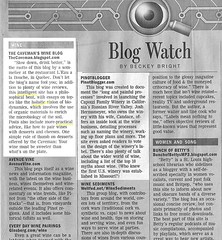
What Was Said....
'...intelligent...'
-Wall Street Journal Oct 23, 2006
'... holistic...'
-Wall Street Journal Oct 23, 2006
'.... practical...'
-Wall Street Journal Oct 23, 2006
'... better than CATS!'
-somebody else
So how cool is that? Monday's Wall Street Journal mentioned my little blog alongside Pinotblogger, Avenuevine, Wine Sediments , Everyday Wine Pairings, and Mag's little irreverent ode to boisson, Wine Offensive. With this benediction brought thousands of new visitors and hundreds of new subscribers. So to all of you who are new readers, welcome!
Of course this means that I now have full licence, and perhaps even an obligation, to rework some favorite posts of the past year (yes, I am slack but what do you expect for free!). So , in honor of the WSJ, here is one of my faves...enjoy and welcome aboard.
Stop Drinking (bad) Corporate Wine!
Tom pointed to an ‘interesting’ article written by Jennifer Rosen defending ‘corporate’ wine. Defending it against whom I am not sure but the crux of her argument posits that this inexpensive ‘corporate’ wine, which is as familiar and as regular in quality as toothpaste, brings more drinkers into the marketplace. In the same breath, she seems to characterize those drinkers who expect more from their wines as neophytes and epiphany seekers, while the ‘clueless masses’ seem to want some sort of ‘bland’ drink that is as ‘reliable and cheap’ as Coke (quality notwithstanding). To paraphrase a paraphrasing blog buddy, her logic seems to suggest that to make wine accessible we must have more shit wine available.
Oh those poor, stupid, taste-deficient masses.
Well, wine is not coke. Unfortunately, there seems to be some underlying sentiment amongst certain in the industry to treat it as such; just another spoke in the wheel of the beverage industry. Perhaps I am being nostalgic and sentimental, but I still want my wine to be made by someone who grew and pressed his own grapes, and whose wine ultimately carries his signature and some sense of place. It might be quaint but there is more often than not a measure of authenticity about the final product that differentiates it from the yellow tails, little penguins, and other mass-produced, ‘brand’-oriented wines that fill supermarket shelves. Rosen makes the point that many of these more ‘artisanal wines’ are ‘perfectly dreadful,’ I agree, some of them are. But on the whole I find most of these wines more interesting, and at least not disgusting.
I have tried these price-point wines on a number of occasions. I am usually unimpressed, sometimes horrified and rarely surprised. My most recent foray into what Ms. Rosen refers to as ‘corporate wines’ was a tasting of Southcorp (Foster’s) ‘Little Penguin.’ The Chardonnay reminded me more of coconut tanning lotion than white wine, and the Shiraz was closer to Robitussin (without that excellent muted buzz). But this is a question of personal taste. I neither buy nor drink these penguin wines, as I won’t most of the cheap wines presently on the market. This is not because they are made by some massive, unfeeling corporate monolith, it is simply because they taste bad.
But, as children who were raised to believe that garlic-flavored popsicles are good, Rosen claims her ‘blandies’ expect nothing more than the ‘Tzatziki pop’ of wine and are thus happy and comfortable in their ignorance. This is bullshit. It is rare that I have not been able to take a person who has drunk only cheap wine and showed them that, for a few dollars more, there is a better option. And the majority of the time, they can taste the difference. Ultimately it is a question of priorities. It isn't that different from spending that extra 20% on organic produce, for it too is often better than the cheaper industrial produce which fills the aisles of your local supermarket.
It just so happens that these super-cheap wines, which are made affordable because of the economy of scale, are often below the threshold of what smaller wineries can afford to produce. I will not even get into how they are made. But for a few dollars more (at least here in Quebec), there exist a plethora of interesting wines from the world over, many made by co-operatives and good, independent winemakers. By supporting these smaller producers, we are supporting diversity, independence, and frankly they need the cash more than the big corps.
The reality of the modern wine industry is that there are fewer and fewer independent winemakers. Cheval Blanc, Etude, Ornellaia, Yquem, Penfolds, Coldstream and a vast majority of the better wine producers worldwide are now part of corporate portfolios. Like in any industry, there are good corps and bad ones. Those which recognize and continue to support the ‘artistry’ of winemaking and have not become complacent with quality deserve our continued support. Ms. Rosen’s characterization of corporate wine as cheap wine is an insult to many of the better corporations which continue to produce great wines. Her article should have been entitled ‘in defense of cheap, mass-produced wine,’ but even then, I don’t agree.The real danger of the big corps with large alchohol and wine portfolios lies more in the distribution end of the industry. It is here where smaller producers and distributors face increasingly difficult challenges and it is here that they need our support. So get off the kangaroo, seek out the independents and ultimately tell your friends to spend a bit more for their bottles, you will be doing both the industry, and your friends, a lot of good.
2 comments:
But I already thought you were great...Just don't let the bright lights and bigger city get to your head ;-)
Dear All, juste visited a nice new web site and I want to share it with you ! Only great FRench wines, great names and champagne, lot of choice and on the top goog prices ! Enjoy
www.evinite.com
Post a Comment